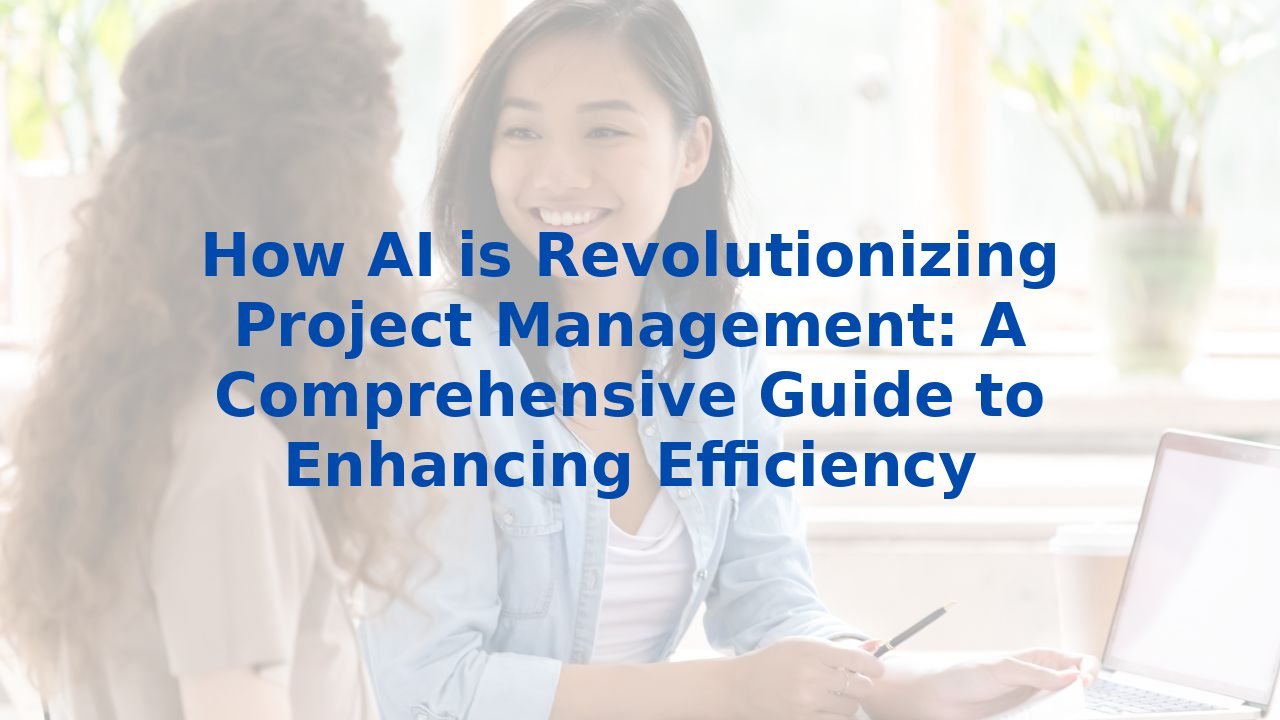How AI is Revolutionizing Project Management: A Comprehensive Guide to Enhancing Efficiency
How AI is Revolutionizing Project Management: A Comprehensive Guide to Enhancing Efficiency
Project management, a domain that intricately weaves together strategy, collaboration, and execution, is experiencing a profound transformation thanks to artificial intelligence (AI). As organizations strive to be more agile and efficient, AI offers groundbreaking opportunities to revamp traditional processes, enhance decision-making, and align teams toward shared goals. In this guide, we delve into the major areas where AI is making its mark—people, process, and business environment—to foster an era of unprecedented efficiency in project management.
1. People: Inspiring and Motivating Teams
At the heart of project management lies the powerful dynamic of human interaction. Here, people are not merely resources; they are the torchbearers of innovation, collaboration, and motivation. AI has the potential to serve as an ally in enhancing this vital aspect of project management.
AI's Role in People Management:
- Task Automation: By automating routine tasks such as scheduling and status updates, AI alleviates the administrative burden on project managers, allowing them to devote their energy toward fostering a motivated and high-performing team.
- Collaboration Tools: AI-driven tools pave the way for seamless document sharing and tracking, establishing a foundation of transparency and encouraging open lines of communication amongst team members.
- Predictive Analytics: AI’s capability to analyze performance data empowers managers to predict potential pitfalls, enabling them to take proactive steps to address team dynamics before they escalate.
2. Process: Mastering Frameworks and Methodologies
The essence of efficient project management resides in the precision of processes and methodologies. Every detail matters, and in this realm, AI excels by refining these processes and streamlining operations.
AI's Role in Process Management:
- Task Prioritization: With AI’s ability to assess the importance and urgency of tasks, project managers can ensure that critical activities are completed on time, ultimately driving project success.
- Risk Management: Early detection of risks is vital; AI can pinpoint potential issues in their infancy, allowing for timely mitigation strategies to be set in motion.
- Resource Allocation: AI optimizes resource deployment based on skill set, availability, and workload—transforming project execution and ensuring that the right talent is in the right place at the right time.
3. Business Environment: Understanding Context and Strategic Alignment
Projects thrive when they resonate with the broader business climate. Understanding market trends and aligning projects with strategic goals is crucial for success. AI acts as a keen observer here, offering insights that shape project trajectories.
AI's Role in Business Environment:
- Predictive Analytics: Harnessing historical data enables AI to provide estimates on project viability, helping organizations identify opportunities and foresee challenges well before they arise.
- Data Analysis: By sifting through massive datasets, AI reveals hidden patterns that inform project health and future outcomes, guiding managers toward informed decision-making.
- Real-time Monitoring: With AI-driven dashboards, project progress can be tracked in real-time, empowering managers to adapt promptly to any deviations from the established plan.
Benefits of AI in Project Management
The integration of AI within project management unlocks a wealth of benefits that extend beyond mere efficiency. Here are some compelling advantages:
- Automation of Routine Tasks: As AI takes on the burden of repetitive tasks, project managers are liberated to focus on strategic initiatives and high-impact decisions.
- Improved Collaboration: AI facilitates smoother teamwork, ensuring that team members can share insights and stay aligned effortlessly.
- Enhanced Decision-making: By providing a wealth of actionable insights, AI strengthens decision-making processes, minimizing biases and accelerating positive outcomes.
- Cost Savings: Optimized resource allocation and proactive risk management lead to substantial cost reductions and greater return on investment.
The Importance of Training Employees for AI
While the capabilities of AI are impressive, the synergy between technology and the human element is paramount. Hence, investing in employee training to effectively harness AI tools becomes pivotal.
- Adaptation to New Tools: As employees become proficient in AI technologies, they can leverage these tools to automate routine tasks effectively, fostering a culture of innovation and efficiency.
- Improved Efficiency: Well-trained employees are empowered to focus on critical activities, driving productivity and leading to stellar project outcomes.
- Enhanced Collaboration: Insistent training on AI tools cultivates a culture of transparency which translates to improved teamwork and communication.
Conclusion
In today’s fast-paced landscape, AI represents not just a tool but a revolutionary mindset shift in project management. By enhancing each domain—people, process, and the overarching business environment—AI is reshaping how projects are conceived and executed. Organizations that embrace this technology, and prioritize training, will find themselves at the forefront of innovation and efficiency, equipped to deliver impactful projects with laser precision.



